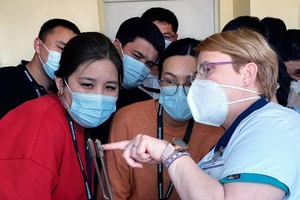Shorter TB treatment regimen shown to be safe and effective in operational research led by WHO
National TB programs in 13 countries worked with WHO/Europe from 2020 to 2023 to examine treatment outcomes for people on 9-month treatment regimens for MDR-TB.
19 June 2024 -- National tuberculosis (TB) programmes in 13 countries worked with the Regional Office of the World Health Organization for Europe (WHO/Europe) from 2020 to 2023 to examine treatment outcomes for people on 9-month treatment regimens for multidrug-resistant tuberculosis (MDR-TB). The findings, recently published in the journal Lancet Infectious Diseases, provide important evidence showing high levels of safety and efficacy with a treatment success rate of 83% and only a 1% probability of recurrence after 12 months.
The research was based on 2636 people, one of the largest cohorts of MDR-TB patients ever studied. It was funded by the Global Fund to Fight AIDS, Tuberculosis and Malaria, the United States Agency for International Development, and the Government of Germany.
To meet the high standards of the study, all of the clinicians and health workers from the national TB programmes had to be trained in a range of areas, such as screening patients for side effects, registering and managing adverse events, and using video observation to check on and support people taking their medication.
According to Dr Liga Kuksa of the Tuberculosis and Lung Disease Center at the Riga East University Hospital in Latvia, the experience of conducting the research was almost as significant as the results. “The encouraging results and also the experience of conducting the research has been very reassuring for doctors treating MDR-TB,” she explained.
“Jumping from a long treatment regimen – which could last up to 3 years with lengthy periods in hospital – to the short treatment regimens can feel risky to a clinician. It’s understandable. We are trained to practise evidence-based medicine and, thanks to this research, clinicians now feel comfortable using these shorter treatment regimens because we have both the evidence and the experience of seeing more people recover from MDR-TB.”
The latest regimens for TB treatment recommended by WHO have been proven to increase a person’s chances of making a full recovery from TB. Now treatment is easier for people to stick to and complete, and the new regimens are more effective. Hospital stays are either kept to a minimum or, in many cases, not necessary at all. Because there are no injectables and far fewer pills, people can be cared for as outpatients. This means that they can continue to be with family and community and potentially continue working.
What is operational research?
Operational research is conducted as part of day-to-day work and combines training and the gathering of data and evidence.
In the course of the WHO study, clinicians from national TB programmes worked with a WHO task force of internationally renowned MDR-TB specialists. Health workers learned to scale up the outpatient models of care, using technology to support patients and ensure they took their medication on time. They were trained to diagnose, register and manage adverse reactions, and to screen for side effects such as problems with eyesight.
Research reveals a bigger picture
The research found a connection between poorer treatment outcomes and noncommunicable disease risks such as smoking, alcohol use and poor nutrition. Monitoring for these underlying factors as part of the research made doctors and nurses aware of influences that could be lowering their patients’ chances of making a full recovery.
An association between unemployment and TB treatment failure also emphasized the importance of addressing the social determinants of health when planning support for people undergoing TB treatment.
Why did the WHO European Region need another regimen?
The safety and efficacy of the standard 9-month treatment regimen recommended by WHO for programmatic use in 2020 had already been established. However, the Region was – and is still – seeing widespread resistance to 4 out of 7 of the main drugs used in the regimen, making it unsuitable for use.
Since no other shorter treatment options were available, WHO/Europe began operational research to establish the effectiveness and safety of 9-month regimens that use different TB medicines.
The 6-month regimen recommended by WHO in 2023 had replaced some of the drugs that were unsuitable for the Region, but the appropriateness of a new drug called pretomanid for certain groups of patients had not yet been investigated; a solution had to be found for pregnant women, breast-feeding mothers and children under 14 years of age. At the time of writing, European Union countries also face challenges procuring the drug.
Consequently, the results of the WHO study open up a life-saving possibility for people who cannot access or are unable to take pretomanid to use a modified 9-month treatment regimen instead.
The 6- and 9-month treatment regimens share many features in terms of implementation, treatment monitoring and adverse-event management, so the study of the 9-month regimens also paved the way for the 6-month regimen to be adopted rapidly where possible.
The 13 countries that took part in the research were Armenia, Azerbaijan, Belarus, Georgia, Kazakhstan, Kyrgyzstan, Latvia, Lithuania, the Republic of Moldova, Tajikistan, Turkmenistan, Ukraine and Uzbekistan.
Full study results can be accessed here /open access/.
Access an accompanying comment here /open access/.
Source: WHO/Europe


